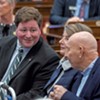Published October 15, 2003 at 8:11 p.m.
"It remains to be seen how many people in our time will make that journey from war to nonviolent action against war. It is the great challenge of our time: how to achieve justice with struggle, but without war." These words from iconoclastic historian Howard Zinn will reverberate through downtown Burlington during the Vermont International Film Festival (VIFF), which begins this Thursday, October 16, and concludes on Monday. Zinn will appear in person for a panel discussion titled "Artists in a Time of War" -- also the title of his upcoming book -- following the premier screening of You Can't Be Neutral on a Moving Train. The documentary on Zinn's life and work was co-produced by local filmmaker Deb Ellis and her Midwestern colleague Denis Mueller.
Actor Danny Glover will also make an appearance at the festival, on Monday, when he will give a press conference and present The Agron-omist. The Jonathan Demme film is part of the festival's "Haitian Showcase," which marks the 200th anniversary of Haiti's revolution for independence from France.
Both events continue the festival tradition of awakening viewers to the myriad struggles carried out beyond the indifferent gaze of mainstream media. The tragedy of 9/11 and global events in the intervening two years have sensitized many moviegoers to the themes that predominate at VIFF. And that may be why Executive Director Mira Niagolova was willing to gamble on expanding both the number of films and the number of people on hand to discuss them. "If we survive this year, I'll be more confident in what we do," she says. "We took a couple of very big risks, and we're really in a bit of a stretch for how this will go."
The larger quantity of films -- more than 65 shorts, features, documentaries and narratives from 11 countries -- is a result of Niagolova's lowering the submission costs from $65 for all films in previous years to $25 for films under 30 minutes and $45 for longer ones. The price of entry to festivals can make all the difference to independent filmmakers.
Niagolova, whose resume includes the Canadian Film Board and Bulgar-ian state TV, is in her second year at the helm of VIFF. Her gamble has paid off particularly well in the area of short films, most of them experimental. "They break traditions and break boundaries," she says. While Niagolova and other festival staff don't like to single out "must-see" movies, they acknowledge a few that are likely to get people talking.
She and VIFF President Barry Snyder both consider Cry for Bobo a gem waiting to be discovered. The British short film is a fictional tale about clowns constantly running afoul of police, who are out to get them for no reason other than that they're clowns. "One begins to understand that these clowns stand for any oppressed people," Snyder says.
The documentary Discovering Dominga also shows up on pre-festival radar. It's the story of a woman who, as a young girl in Guatemala, wandered the cornfields after her parents were killed. She is eventually taken in by a Catholic relief organization and relocated to Iowa, where the film and her journey of self-discovery begin -- thanks in part to the Midwestern community that takes an interest in her cause and, in the process, be-comes aware of the political killings in Central America.
Snyder, a cinema studies professor at Burlington College, also has his eye on Etre et Avoir (To Be and to Have). Reportedly the largest-grossing documentary in France ever, this story about a French educator earned accolades at Cannes in 2002 for its moving portrayal of the small but powerful changes an individual can make in the lives of others.
In addition to the Howard Zinn documentary, another Vermont collaboration piques political interest. From Vermont directors Anne Macksoud and John Ankele comes Arms for the Poor, a commentary on the priorities of the military-industrial complex. Macksoud was last year's winner of the James Goldstone Award, sponsored by the Vermont Film Commission, for her documentary on AIDS in Africa. Arms for the Poor, Snyder says, "is just a brilliant example of what you can do with half-hour films in terms of capturing the essence of an issue. It's full of images that are hard to look at, but… [it's] just a powerful, educational film."
The Vermont Showcase at VIFF this year features 18 films. There's the musical short Da Speech, in which director John Douglas uses a synth-rap track from Simon Stockhausen to score footage from the Iraq war. There's director Arthur Bell's whimsical short, Only a Farmer, in which farmers read a poem to reflect on the beauty and sparseness of the land. And there's the civic-minded Town Meeting, from director Bond Sandoe, in which Vermonters debate civil unions in a fictional tale drawing on verbatim quotes from nonfiction sources.
Civic debate has always has been the driving force of VIFF. For Snyder, organizing films in "showcases" -- including panel discussions and the like -- creates opportunities to explore issues in a broader context. Thus, Zinn and Glover appear in conjunction with film screenings. Likewise with the "Nuclear Showcase" and a special tribute to VIFF co-founder George Cullinen, who died in March. Cullinen's work in the anti-nuclear movement catalyzed the first festival in 1982. Following a no-nukes march between the rural communities of Washington and Moscow, Vermont, he produced the documentary From Washington to Moscow, which won a UNESCO prize at the Hiroshima Inter-national Film Festival in 1983. The film will screen at this year's VIFF, complemented by art and photography exhibits at venues around town.
Another panel discussion will focus on the business of filmmaking, with representatives of First Run, a New York City-based film distribution company, joining Vermont filmmakers and producers to break down the task of breaking in. "One panel leads to another," Niago-lova says. "It's all interconnected."
Howard Zinn's talk, though, is likely to create the most buzz. Considered a kind of "elder statesman" of the political left by two generations now, Zinn packs formidable street credibility. From his civil-rights activism in the South, which cost him his teaching job at Spelman College in Atlanta, to his pitched political battles on campus with former Boston University President John Silber, to the million-plus copies sold of his innovative text A People's History of the United States, Zinn has emerged as a four-star general in the war against complacency. He stands shoulder-to-shoulder with the likes of Noam Chomsky in the Pentagon of the proletariat. He even gets a nod from Matt Damon's character in the film Good Will Hunting. Both Chomsky and Damon lend their star power to the Ellis-Mueller documentary; Damon, a neighbor and virtually lifelong student of Zinn's, narrates the film.
Zinn is still a fighter -- in "retirement" he has continued to write books and even stage plays about heroes in the movements he supports: Emma, about anarchist Emma Goldman, and Marx in Soho. Viewers of You Can't Be Neutral on a Moving Train may be surprised by Zinn's charm. "We really discovered this incredibly warm person," Ellis says. "He's not a very didactic, angry man at all." Zinn reminded her, she says, "that you can be an activist, you can be a radical, and you can love life."
For all his personal attributes, Ellis adds, what really defines Zinn as a voice for the voiceless is his acumen as a storyteller. "He understands the role of storytelling in passing on ideas about our world and how our world works," she says. "He brings to life these stories of people who are working, who are the backbone of our society. Usually when we read history, we read from the top down. He starts from the other end."
Ellis hopes her film can achieve what VIFF is going for. "One of the strengths of the film is that it speaks to people who ordinarily wouldn't listen to him," she says. "He has the capacity to speak beyond the committed." Zinn may have an important message even for diehard radicals, particularly those suffering from battle fatigue. "He brings back the optimism, and I think he reminds us that we need to keep on going," Ellis suggests.
Despite the abundance of films and panel discussions, this year's VIFF will be easier to attend than in past years due to its strictly downtown venues -- including a new space in the Firehouse Center for the Arts. Named in memory of former VIFF head Lorraine B. Good, the screening room on the second floor of the Firehouse will allow VIFF to host film screenings, retrospectives and other events throughout the year. "We are so lucky with this relationship, and so grateful to City Arts," Niago-lova says. "We want to be downtown… It's very important for the success of the festival not to be spread all over the place."
Niagolova is also quick to recognize The Roxy's support of the festival and the mutual benefits of VIFF's relationship with owner Merrill Jarvis. "They're welcoming, and we hope that together we can build a strong audience not only for the festival," she says, "but this will help Merrill, too, to have some of our audience throughout the year… a big, 35-millimeter screening room is really fantastic."
While Niagolova braces for this year's unique test of VIFF's resources and logistical skills, Snyder acknowledges the ongoing challenge in presenting independent films. "I think there's this misperception that people are going to have to sit down and endure didactic propaganda, and that's the misperception that I'd challenge the most," he says, "Because in the end, whether a film is a documentary or a fictional narrative, what makes a good movie a good movie is the same. And these are good movies.
"The purpose of the festival is not to put forth propaganda," Snyder adds. "It's to put forth films that engage and enrich a discourse around issues that are less well represented in mainstream media."
Ironically, the topsy-turvy state of the world seems to be bolstering moviegoers' appetite for the kinds of stories told at this festival. "The economy is not very friendly for film festivals now," Niagolova notes, "although for festivals like ours that show films of global concern -- we have the winds with us."
More By This Author
Speaking of Movies
-

Next Month Brings the Final Curtain for Palace 9 Cinemas
Oct 27, 2023 -

Book Review: 'Save Me a Seat! A Life With Movies,' Rick Winston
Aug 30, 2023 -

Steve MacQueen Named Executive Director of Vermont International Film Festival
May 22, 2023 -

Vermonters Are Going Back to the Movies — Under the Stars
Aug 26, 2020 -

Where to Catch a Movie Near Burlington
Sep 11, 2018 - More »
Comments
Comments are closed.
From 2014-2020, Seven Days allowed readers to comment on all stories posted on our website. While we've appreciated the suggestions and insights, right now Seven Days is prioritizing our core mission — producing high-quality, responsible local journalism — over moderating online debates between readers.
To criticize, correct or praise our reporting, please send us a letter to the editor or send us a tip. We’ll check it out and report the results.
Online comments may return when we have better tech tools for managing them. Thanks for reading.














































